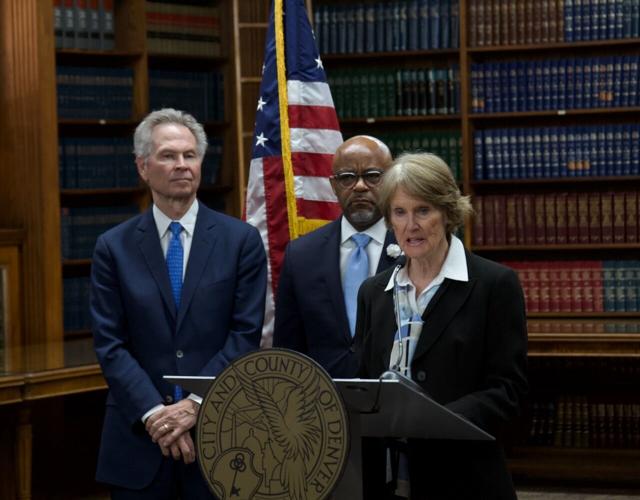Think tank on car thefts: Longer view paints dire picture for Colorado

Denver Police Chief Ron Thomas, flanked by Mayor Michael Hancock (left) and District Attorney Beth McCann, speaks to the departments' successes in addressing Denver's public safety concerns at a press conference on April 25, 2023. He specifically highlighted the first full class at the Denver Police Academy since the COVID-19 pandemic shutdowns in 2020. (Alex Edwards/The Denver Gazette)
Alex Edwards/Denver Gazette
While not disputing the declining car theft figures Denver officials cited, a think tank argued that viewing the stats from a longer timeframe offers the public a more precise and comprehensive view of crime both in the city and the state and whether Colorado leaders’ public policy response is working.
Denver officials last week said property crimes went down and auto thefts declined by 27% year-to-date compared to 2022. This amounts to about 1,300 fewer car thefts, officials said, emphasizing that the city is seeing a double digit decrease in property and violent crimes in the central business district.
The Common Sense Institute chose to sift through data from 2014 to date, noting that car thefts statewide rose by 233% in that period — from 12,262 in 2014 to 46,568 in 2022
The year 2014, the group said, is consequential, since that’s when lawmakers changed the laws to tie the punishment to the value of the car. The law lowered vehicle theft from a Class 4 to a Class 5 felony if the value of the stolen car is less than $20,000 and raised the threshold for a Class 4 felony from $20,000 to $100,000 or more.
“Motor vehicle theft (MVT) remains a statewide problem,” said Kristin Strohm, CSI’s president & CEO.
Strohm said annualizing three months of statewide data in 2023 means the rate would hit 627.6 per 100,000 residents.
And while that’s 22% lower than the rate in 2022 of 801.4 per 100,000, it remains still far worse — 161% higher, to be exact — than 2014’s rate of 240.56 car thefts per resident.
Chris Brown, CSI’s vice president of policy research, also noted the decline in car thefts in Denver.
Specifically, the January-March average MVT rate went down 20% compared to the same period last year, Brown said.
But that figure is still 243% higher than the 2014 January-March average rate of 42.68.
“The largest decline occurred in March,” Brown said, “and while those offenses are still trickling into the data set, it is still too early to say whether this is a new trend or single month change.”
|
MVT Rate(per 100,000) in Denver |
|||
|
22-Jan |
22-Feb |
22-Mar |
3-month Average |
|
174.82 |
175.9 |
195.22 |
181.98 |
|
|
|
|
|
|
23-Jan |
23-Feb |
23-Mar |
3-month Average |
|
170.49 |
140.1 |
128.34 |
146.31 |
In a news release, CSI officials said car thefts result in direct fiscal and economic consequences for Colorado.
For example, according to the release, the increase in car thefts rate last year led to a $277,000,000 hike in motor vehicle insurance premiums, which amounts to $239 per household for the year; a decrease in 1,530 jobs statewide; $101,000,000 reduction in personal income; and, $158 million reduction in state gross domestic product.
CSI noted that $239 per household increase reflects only the difference between 2022 and 2014 — it does not reflect the full cost of auto thefts.
The group also attributed a 0.11% hike in inflation to auto theft.
“It’s clear: All Coloradans pay for the state’s auto theft numbers,” said Mitch Morrissey, the group’s CSI 2023 Owens-Early Criminal Justice Fellow. “Every one of us, regardless of whether our car has been stolen or not. It’s a loss that we all share and must address together to safeguard our economy and our fellow citizens.”
Last month, Mayor Michael Hancock said that, while city leaders remain unsatisfied with Denver’s public safety landscape, a slew of programs and initiatives have begun to improve Denver’s crime situation.
Flanked by U.S. Attorney Cole Finegan, Denver District Attorney Beth McCann and other city officials, the mayor attributed the improvements to the city’s Public Safety Action Plan, which Denver unveiled last year in response to a surge in violent crimes.
“We’ve seen some welcome improvements across the city, especially downtown,” Hancock said. “Some categories of crime have decreased, and we remain focused on making sure these downward trends continue moving in the right direction. This includes hiring more officers and expanding our behavioral health outreach. We’re also addressing challenges as they arise with our downtown partners.”
Denver’s crime rate — car theft, in particular — is among the worst in the country. Curbing car theft, specifically, and crime, generally, has consistently been among the top issues for city residents. Denver’s candidates for mayors, for example, have vowed to tackle the issue head on, although some experts say whoever sits as the next mayor will likely take advantage of existing anti-crime initiatives, rather than start completely anew.
Some have directly blamed state officials for Denver’s crime woes, arguing policies out of the state Capitol have hampered crime efforts by being too “criminal-friendly.” The policies’ backers counter that a tough-on-crime approach hasn’t worked.
At the April 25 press conference, officials announced enhancements to existing programs. They also noted that a law enforcement response to crime is not the only tool the city has deployed.
Officials acknowledged that public health improvements need to be complemented with a robust Denver Police Department. Recently, the department added 36 new academy graduates to its ranks, and will welcome 50 in the next class. This is the most well staffed DPD has been since before the COVID-19 Pandemic Thomas said.
At the press conference, both Thomas and Hancock agreed putting school resource officers back into schools will be a net positive for Denver. They said it’s not the only solution, prompting McCann to highlight a new citywide initiative called handgun intervention program or HIP.
“We started the HIP program in conjunction with our partners in juvenile court to focus on kids who are picked up with guns but haven’t used them yet,” she said. “Through this program, we provide young people with mentors, training and support. While HIP is new, the early results are encouraging.”







